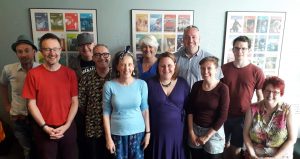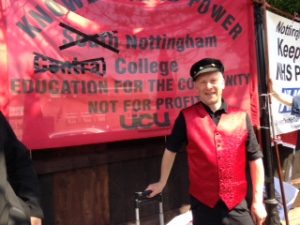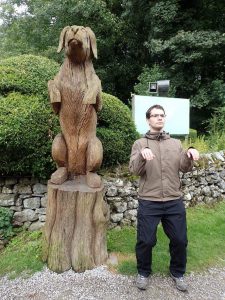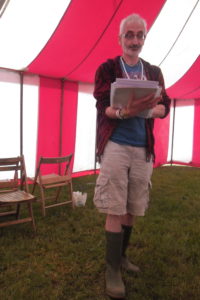DIY Poets Quarterly Showcase November 2019
Review of DIY Poets Quarterly Showcase November 14th 2019. Location: City Arts, Nottingham.
(First half mostly reviewed by Clare Stewart, second half mostly by Vron McIntyre.)
This was my (Clare’s) first DIY quarterly gig at City Arts, I like it, I like the atmosphere, the bar is good, the location is all right, comfortable, good acoustics, yeah. Andrew Martin and Laura Grevel shared compering duties, they did v well, made the evening fun, and ensured the evening ran smoothly. John Humphreys also looked after timings, and helped keep things run to time. We tried the sandtimer thing too. Some people remember/take to it, others don’t. That’s how it goes.
Angelina
Angelina’s quite new to the poetry scene and this was her first time performing. Welcome to DIY, Angelina. I look forward to hearing more from her and hope she will become a DIY stalwart!! Angelina’s poems were about chicken pox, her annoying loveable little brother, her Inner Me, and a reflection about what’s in her mind. Simple, almost childlike, straightforward, easy rhymes. But don’t be deceived. There is an awful lot said in that simplicity.
Sue Allen
With impeccable timing and rhyming, Sue Allen gave us three of her best loved funny risqué poems. Johnny Depp’s string vest and the misadventures of mankini man involved a lot of lycra and tying up, while the buzz of her novel new alarm clock sent any remaining blues packing.

Martin Grey
Three poems about place. Our well-travelled Marathon Martin ran the marathon, in arathon!!! And gave us a poem about this experience, the rainbow of nationalities, trying to say Thank you in Greek. Next up, a poem I’m very fond of, a place very familiar to Martin, Berlin, about being stranded in the rain. The refrain It rained a lot in Berlin that day produces a feeling of nostalgia and romance. And the third place was his hometown of Guildford, a memorable underfoot crunch, as featured in the latest DIY zine (just out!)
Neil
A long and a short one. The long one was Every Contact Leaves a Trace, a grisly gothic love story, about a lipsticky angel’s poisoned kiss that leaves a deadly virus, a disease, a bubonic nastiness? Ghastly and scary. The short one Freedom is Just Another Word about corruption and the lack of justice in our world, til Freedom becomes meaningless. Mm, can’t disagree, Neil…
Vron
A problem with her chair meant that Vron had to perform from the floor and not on the stage which was a shame, and yeah, just typical, eh? the moment you need the thing to work, it gives up…. (We sorted it later, and she got home okay, I think…) A poem about writing, a snapshot, waking up in the middle of the night and trying to write down the conversation going on in your head. With surreal fishing imagery. Princess and the Pea, a sarcastic drama poem about being gaslighted. Over peas. Pea scatterers take all the blame. Just leave that princess on her lumpy bed, Vron!! You scatter all you want grrl! And a poem about devices that make you look busy when you just don’t want to look like a Billy No-mates…

Andrew Martin
Andrew’s poetry has recurring themes of the natural world and global warming in his first three poems. His first poem was sorta sciencey. Grid North and Magnetic North aligned recently (who knew?) and won’t do that again for a very long time. I don’t know what that means, but I get that it was a magical rare happening, and how wonderful that is. And I also vaguely wonder why I didn’t feel something when it happened? Then a poem about coal and coalmining villages, the complex relationship of a community to its local industry, concerns about health and ecology and how we value people. Then back into outer space to think about a black hole. Andrew also mines news stories for ideas for poems. And this was about a goose that crashed into a taxi during goose fair week. Irony and humour collide.
Clare S
Clare decided to give us some good humoured poems. Chocolate Brownies was stuffed with good wholesome happy things about childhood, and a poem about an early teacher Miss Bijetti involved spaghetti, confetti and floaty dresses. Clare described many wonderful things she could be doing, were she not lying in the sun, not feeling guilty or bored. And I particularly liked Heart, Head, Hormones, a deft and witty take on the sometimes conflicting responses we experience as we weigh up internal impulses of emotion, caution and attraction.
John Merchant
John read two poems. His deep faith leads him to write poems that are meaningful, kind, full of hope. I think John is aware that not all of us follow a god, and consequently switch off when hearing a religious poems, so he often twins poems, as he says, a secular poem followed by the religious version. John uses repetition and rhyme to give us his message. I’m not very good at receiving advice, and I’m not keen on advice given through poetry, but John is so well-meaning and his message so full of simple kindness and hope that I can’t complain about. It’s encouraging to be reminded that good things happen.
Birgit
This was Birgit’s first time reading her poems at DIY. Three very interesting and thought provoking poems, an evocative description of a first date, the competing demands of being a busy mum trying to write poetry, and a portrait of her mother, about Trümmerfrau, translated as rubble-women, women who helped clear bomb sites after Allied bombing, and Birgit’s mother was part of this effort. This was a great first performance for DIY, hope to hear more of Birgit’s impressive poetry in future.
John Humphreys
John read us two strong and vivid poems he said he had to write, with plenty of informative preamble. First was a fantastical description of a house with roots, based on a surrealistic painting, describing its “beard of roots” and referring to an “octopus in a sea of sorrow”. The second was inspired by a film about traditional Macedonian beekeepers, and how they had ways of farming sustainably like “take half, leave half” of the honey, an approach not shared by new neighbours who don’t understand how to make it work “a microcosm of all our struggles with nature”. Great stuff to finish the DIY Poets section of the evening.
And then to the Open Mic, which was also stuffed amazingly full of talent.
Guy gave us three poems – a drinking binge replete with nautical metaphors – ‘drunk like the Cutty Sark’ – a tense almost-confrontation with an elderly bus passenger over a priority seat, and a thought provoking piece about his father-in-law dying on the Isle of Wight involving a crow on a cliff, a small girl, and a search for meaning.
Alex gave us two interesting pieces, the first a quiet poem, about quietness. He described heads moving, which “agree, but not with you”, and touched on self-loathing.
The second, which he’d written in the intermission, offered us humorous choices between unappealing alternatives like “burnt toast or cold tea” or “half a rotten onion or no food at all”. We were left to guess what this might have been referring to.
Stuart’s first poem was about “Silent Letters” (from his “Venetian period”) and their importance to the words we use even if we don’t speak them aloud. He followed with a poem (from his “Morrison’s café period”) pondering funky modern vegetable names, and ended with an exploration of the complications of old railway timetables, full of train-related metaphor.

Will, in his inimitable style, gave us one longer poem, “Cannibalism at the Nature Reserve” full of dramatic descriptions of a slug, bisected by a bicycle, providing a feast for its sluggy friends “like pigs at the trough” and all the implications, mentioning the “steady dissection of an old friend” and “reckless cuisine”. It managed to be both tragic and funny. Good stuff.
Gail read “The Return” describing the soft hills of the coal valley of her origins, and telling us “mountains surround my psyche”, an expression of hiraeth. “Bute Avenue” was a love poem describing the excitement of a first kiss with someone with red hair and an “itchy deterrent trench coat”, and “waiting to fall in love”. The third poem was a vivid description of a black locust tree with orange blossoms, a “settler” in Bridgford Park.
Jess’s offering, delivered in confident note-free style, was about her brother, indulging in substances, instead of doing much with his life despite her repeated attempts to convey the message that “intelligence without aspiration is like a bird without wings”. Very sad. Very impressive.
And finally Rose gave us “Revolting Squares” a detailed and passionate account of her involvement in recent Extinction Rebellion protests with a wide range of people, both local and in London, giving us the hopeful message that “people are uprising”.

Then to our featured poet of the evening Kevin Jackson, resplendent in a gorgeous blue jumper and a string of pearls, reminding us there is nothing more radical than listening to each other.
Kevin’s poems speak powerfully and thoughtfully of love and relationship to others and his delight in and deep connection with the natural world, and also remind us of the need to work for tolerance and against injustice. From the first poem, with its branches of the enchanted forest “numberless like the names of love” and its birds, who “do fly, as do we” there is a message of optimism, in the face of loss and grief, the prospect of healing, reconnection and joy. “Touching You”, the title poem of his first collection, reminds us “don’t take a second for granted” and of the need to set aside our doubts and reach out. “Sapiens” deals with war and remembrance and tells us tolerance is not hardwired into us, and so must be worked on. “Love’s Garden” is a poignant response to the death of 49 queer people in the Orlando nightclub shooting, the tangible result of intolerance. He tears a flag into strips: “When 49 is reached, the whole garden loosens, as if weeping”. “Queer, Queerer, Queerest” gives us permission to love rebelliously, generously, to sing, dance and cry as we see fit.
In other pieces we hear about the calf going to the slaughterhouse, a homeless man no-one will reach out to, kissing in the rain, of “laughter like a ladder” and “moonlight scratched from standing stones”. For me two of the most powerful pieces in the set came towards the end. “Looking Out” is a moving poem relating age, crafting and memory, “knitting cellular poetry”, and finishing “I’m an oak tree, she knitted me well”. In “Finally” Kevin relates the impact on his mother of the death of his father when he was fifteen, just at the point where he had found joyful love with his best friend, which in the face of his mother’s grief he can’t disclose, despite his “body full of song, body bursting higgledy-piggledy into flowers”. Both these pieces were very moving, and like the rest of the set, full of lush and beautiful imagery. Kevin’s second collection “Loves Burn” will be out soon from Big White Shed, and I think this performance showed that we’ll be in for a treat.
To round off the evening we were lucky enough to have a set from talented up and coming singer- songwriter Jimi Mack. Skilful guitar playing, emotionally complex lyrics, touching on themes of relationship, loss, mental health (these were, he said, his “miserable” songs) and a great, resonant voice, singing vocals full of light and shade, made this a memorable performance. Definitely one to watch!
[DIY Poets Quarterly Showcase November 2019]